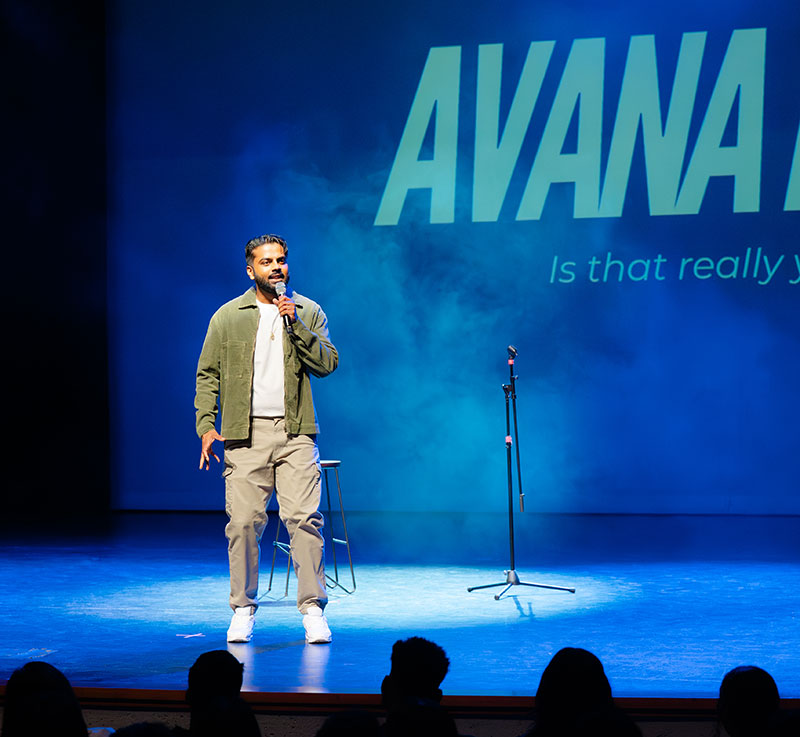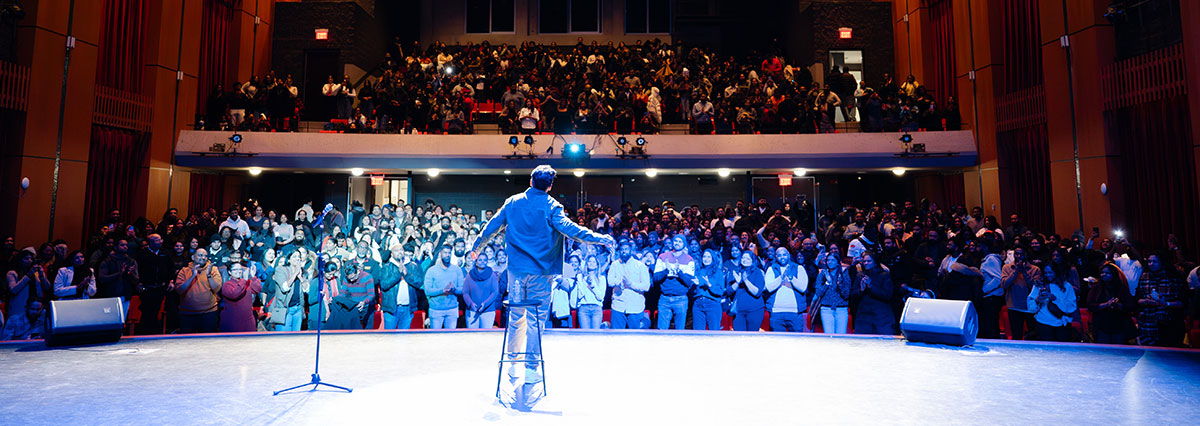By Mallik J
Sunthar V is a boundary-breaking Tamil comedian whose blend of sharp wit and soulful storytelling has captivated audiences across Toronto, London, and New York. As the first Eelam Tamil comic born and raised in the West to tour internationally, Sunthar’s comedy draws deeply from his identity—queer, diasporic, and shaped by a refugee lineage. His sets are a rare mix of hilarious and heartfelt, exploring everything from coming out to brown parents, diaspora identity crises, and the chaos of navigating fame in the digital age. Whether he’s unpacking cultural taboos, poking fun at Tamil uncles, or reflecting on generational trauma, Sunthar delivers every line with honesty and empathy. His hit shows have sold out venues and touched hearts globally, leaving audiences laughing, thinking, and feeling seen. Above all, Sunthar isn’t just here to entertain—he’s here to shift narratives, celebrate truth, and bring people along for the ride.
In a heartfelt conversation with Vibe, Sunthar opens up about his life.
Excerpts:
Your comedy blends sharp wit with soul-deep storytelling. What’s your secret to making people laugh while also making them feel something?
I try to be as real as possible. Sure, comedy is about wordplay and exaggeration—but it also has to make sense. I want my stories and opinions to connect with the audience. I never want to isolate people; I’d rather they come along for the ride. Even if they don’t agree with me, I hope they understand where I’m coming from—and most importantly, laugh.
You’ve performed across Toronto, London, and New York. What’s the vibe difference between audiences in these cities—and do you tailor your sets accordingly?
Toronto and London are both home for me. I grew up in Toronto and really found my voice as a comic in London. Both cities have large Tamil diaspora communities that helped shape the stories I tell. I love performing there. New York and the U.S. Tamil crowd are a bit different—they’re very “American first.” In the U.S., where the identity conversation leans more towards the “melting pot,” I think a lot of people see me and feel permission to lean into their heritage—Tamil, South Indian, whatever it may be. They often tell me how refreshing it is to see someone be unapologetically themselves.
Your show HOME resonated deeply with people from so many backgrounds. What was the most surprising or touching reaction you received?
HOME was my first half-hour special. It explored my foray into queerness while bringing Tamil audiences along with me.
I wanted to normalize taboo topics in a way that felt funny, real, and engaging. The most touching feedback has always been people telling me it helped them feel less alone.
What’s a joke or story that almost didn’t make it into a show—but ended up being a crowd favourite?
I have a bit about fans constantly asking me to come to their city, and then when I do, they’re “busy.” Meanwhile, if a Kollywood composer comes to town, they’re dropping everything. I use it to talk about where I’m at in my career—how touring isn’t always glamorous, and I’m still flying economy. It’s honest, a little cheeky, and it really lands.


Comedy often comes from pain. What’s one ‘trauma’ you’ve turned into one of your proudest punchlines?
My coming out story to my amma was one of the first jokes I ever wrote. It’s evolved over the years, but at its core, it’s still a deeply personal story that connects not just with queer folks— but with anyone who’s had to navigate hard conversations with brown parents.
As an openly queer Tamil comedian, how do you balance the personal with the performative onstage?
They’re intertwined. Being openly queer and public comes with its own set of challenges. Sometimes, when I joke about adult Sunthar V content or sexuality, people confuse the storytelling with a kind of access to who I am. Even though the stories are rooted in truth, people forget there’s a difference between stage-me and real-me. I’m learning to manage that—especially when they’re surprised to see me just trying to buy groceries like a regular person.
Has your identity ever been a barrier in the comedy world—or has it become your superpower?
It’s definitely my superpower now. Tamil comedy has long been dominated by cishet men, mostly from India. I’m the first Eelam Tamil born and raised in the West to tour like this, and that gives me a unique lens. People are curious, people relate, and I’ve leaned into that.
What does authentic representation look like to you—not just in comedy, but in the creative industry?
Let people tell their own stories in their own way—and get paid for it, if that’s what they want. We need more diverse voices telling human stories. Especially now, with AI everywhere, I hope we don’t lose the raw, real creativity that comes from lived experience. We also need more champions of indie artists in the diaspora.
When did you first realize that telling your story onstage wasn’t just cathartic for you—but healing for others?
From my very first open mic, people came up to me to say how much it meant to hear someone talk about what I was talking about. Years later, I still get messages from around the world—from people who felt seen, who laughed, who thought differently. That’s a blessing.
What do you hope young queer or Tamil creatives see in you when they watch you perform?
I hope they see something in me that they like—and take it with them. I’m not perfect, and I might not be everyone’s favourite, but if you find something in my chaos that feels familiar, then I’ve done something right. I want queer folks especially to know they’re not alone. I feel so seen by the queer people who come to my shows, and I hope they feel that too when they see me.
Founding London’s first Tamil Comedy Club is huge. What inspired you to create that space—and what’s been the most magical moment so far?
Honestly, there just wasn’t a space for Tamil comedy in London—so I made one. It blew up. I’ve since shifted focus to touring my own shows, but I’d love to bring it back—maybe in Toronto, now that I’m mostly based here.
Being a child of refugees must bring a unique lens to your storytelling. How do those roots influence your voice as a comedian?
Empathy, understanding, and trauma. Those three things shape so much of my comedy. I think my queerness and my refugee background both inform the way I see the world—and the way I tell stories.
Every damn day. Showbiz doesn’t stop. And I’m not making millions—yet—so it’s a grind: trying to stay relevant online, sell tickets, book venues, maintain relationships… and do it all without the structure of a 9–5. It’s hard to feel like I’m making progress—but I think I am?
Please take us back to where it all started… your growing up years, influences, and inspirations.
Come see a show. I talk about all of this in Avana Nee, my first special.
What according to you is the superpower comedy possesses?
Comedy lets people drop their guard. It’s one of the few places where people show up with an open heart. That’s the superpower—getting them to stay with you, to care, to laugh. Especially in a world that’s obsessed with 50-second content, holding attention is a skill I’m still learning.
If you could go back and give a pep talk to your younger self just before your first set in 2019, what would you say?
This hobby you’re trying? It’ll be your full-time job one day. Enjoy it before it becomes work.
Please tell us more about Millennial Trauma + Gen-Z Drama.
I’m teaming up with Me2Chat (Mithusha), one of my favourite Tamil creators. After four sold-out shows in Toronto, we decided to take it to Europe—and most cities are already 80% sold out. The show’s about generational differences, our personal takes on life, and it includes a lot of audience interaction and games. It’s loosely structured to allow for spontaneity, which has been a hit. I’m so excited to meet fans on this tour.

